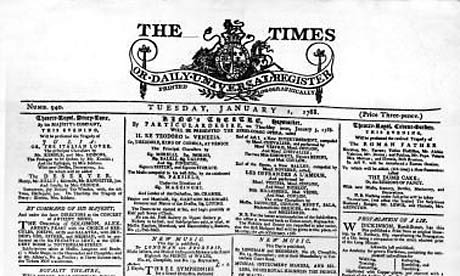
The Daily Telegraph is pretty pleased with itself today – "You read it here first: words the Telegraph lexiconated". But not as pleased as the Times – "You read it here first: The Times is biggest source for OED".
Both papers take the relaunch of the Oxford English Dictionary website – and new features listing all the sources for its 3m quotations, and the first written evidence of a word – as an opportunity to highlight their contribution to our mother tongue.
The Telegraph headline is from the print version of the story – it's different online. The Times story is behind the website paywall. But you get the drift.
Turns out the Times has more OED quotations than any other source – 36,204 to be precise, 1.16% of the total – ahead of William Shakespeare, Sir Walter Scott and The Philosophical Transactions of the Royal Society of London.
In terms of first written evidence, the Times scores 1,634 – the fourth highest, behind Philosophical Transactions, Chaucer and 14th century translator John Trevisa.
The Telegraph has 251 – and reports that five of the top 15 sources used by the OED are newspapers.
Words that were first recorded as being written down in the Times include "pouf" and "nurdle".
The Telegraph is more forthcoming on this front, telling us it made the first use in print of words ranging from "alcopop" (1996) and "eco-friendly" (1989) to "anaesthetist" (1882) and "underdog" (1887).
And the Telegraph has fun with words that had their moment and fell out of fashion, including "hoolivan" (1985: a police van carrying equipment for observing crowd behaviour), "squodgy" (1970: soft and soggy), "votress" (1894: a female voter), and "baloonacy" (1860s: described the craze for ballooning).
John Simpson, the OED's chief editor, tells the Telegraph:
"Newspapers have always been very useful for the dictionary, even though the first publishers tried to stop newspapers being used because they thought they were too trivial. The editors won the day.
"They have always been good at recording new words picked up either in the school playground or in politics."
And as for why the Times and Telegraph make the OED so often?: "Probably because they are the newspapers that the readers and editors of the dictionary read."

